Hugh Huxley, pioneering experimentalist, dies at 89
Huxley came to Brandeis in 1987 as professor of biology and director of the Rosenstiel Basic Medical Sciences Research Center

Professor emeritus Hugh Huxley, a biologist who conducted pioneering research on muscle structure and function, died July 25, following a heart attack at his home in Woods Hole, Mass. He was 89.
Working productively right up to his death, Huxley maintained the “enthusiasm and dedication of a graduate student,” says Professor emeritus Gregory Petsko, who succeeded Huxley as director of the Rosenstiel Basic Medical Sciences Research Center in 1997, when Huxley retired from the faculty.
Educated at the University of Cambridge, Huxley joined the Medical Research Council (MRC) Laboratory of Molecular Biology in 1948. He was the first PhD student to join the MRC Unit for the Study of the Molecular Structure of Biological Systems. It was at this renowned Cambridge, U.K. research center that he began his pioneering studies of muscle structure and function using X-ray diffraction and electron microscopy.
In 1954, as a post-doc at MIT, he proposed the sliding filament theory of muscle contraction and described how the interaction between the actin and myosin filaments produced contraction via the cross-bridge cycle, according to MRC. Following his MIT fellowship, Huxley spent five years on the faculty of University College London, before returning as a founding member of the MRC Laboratory of Molecular Biology in 1962, and eventually becoming deputy director from 1979-1987.
Huxley came to Brandeis in 1987 as professor of biology and director of the Rosenstiel Basic Medical Sciences Research Center. He continued his research on muscle structure and function at Brandeis, providing molecular explanations of complex processes in the machinery of living cells.
“It would be difficult to overstate the importance of this work,” says Petsko. “It was the first real molecular explanation for any of the complex processes that occur in the machinery of living cells. And it has held up remarkably well for more than 50 years.”
The scientific world agreed: His seminal scientific accomplishments were recognized on both sides of the Atlantic. In 1960 he was made a Fellow of the Royal Society, and in 1978 he became a Foreign Associate of the National Academy of Sciences. Huxley was also awarded the Royal Medal in 1977 and the Copley Medal in 1997.
“While deeply immersed in his own research, he was always eager to hear about the work of others and delighted in their successes,” says Provost Steve Goldstein. “He remained a model of the research scientist, never losing his enthusiasm for doing experiments with his own hands.”
Categories: General, Science and Technology





